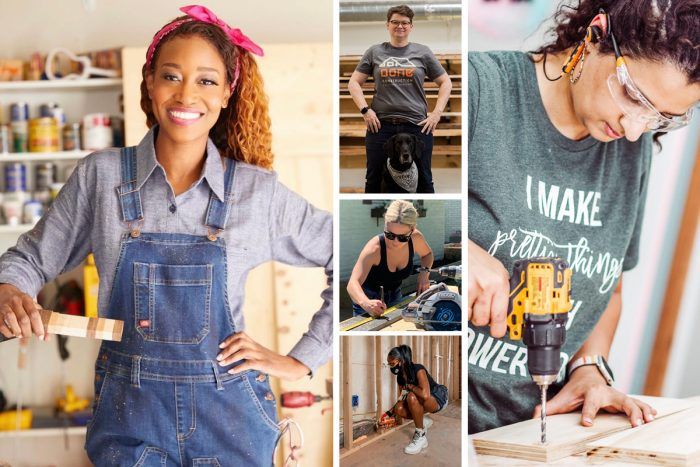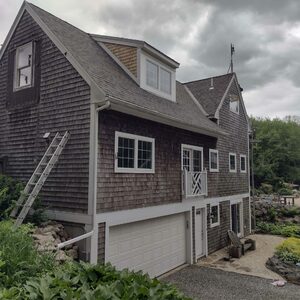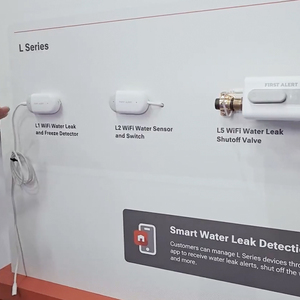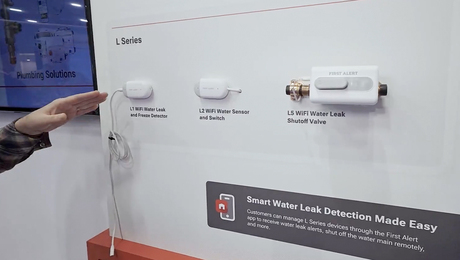Find a Female Tradesperson With Matriarchy Build
With a goal of getting tools into the hands of more women, this new web service enables people to set up consultation calls with women and nonbinary pros on a variety of home-construction projects.

Who can you call for home advice when you don’t have a contractor in your life?
For Julia Turshen, a New York Times bestselling cookbook author used to being the go-to resource when it comes to recipes, that person was Beth Pointer, a general contractor based out of Baltimore. Julia and her spouse were thinking about remodeling their bathroom and also needed to repair some rotted wood siding on their house. While Julia had some familiarity with tools as an amateur woodworker, she discovered they would need someone with a more in-depth skillset to provide guidance.
So she booked two consultations with Beth through Matriarchy Build, a new online service that enables people looking to accomplish residential projects to consult virtually with a pro—one to discuss what questions to ask of a contractor on large projects such as a bathroom remodel, and one to walk through how to replace the rotting wood siding, step by step.
“I went in overwhelmed and I left feeling empowered,” Julia said of her first consultation call with Beth for the bathroom remodel. “Beth brought up things we never would have thought of, and I feel like the hour that we spent with Beth will probably save us so much time and money in the future.” And for Julia’s siding-repair project, Beth walked her through what tools she would need and what issues she might encounter when doing the work. Within 24 hours of the call, Julia had the siding fixed.
Founded by Gabriella Ainslie and Lacey Soslow, Matriarchy Build’s roster of pros aren’t what typically comes to mind when people think of folks in the trades—they are all women and nonbinary people. The website launched in spring of 2022 and currently lists 32 pros to choose from with skills in everything from carpentry to electric to design and more.
We talked with Gabriella and Lacey to hear more about their ideas and goals for Matriarchy Build as well as the specifics of how the service works.
Q&A with Lacey and Gabriella, founders of Matriarchy Build
LMH: How did you get this started?
Lacey: I was doing some renovation projects with my mom where we’d find really cool old homes in Philly. But I noticed a lack of representation of women in the space when trying to hire folks. It was a pain point, but I didn’t know what to do. And then during the pandemic, Gabriella called me expressing the same concerns.
Gabriella: We had a crazy freeze in Texas in which the grid broke down. Everyone was scrambling with how to repair things. Meanwhile, my mom had this amazing all-female gardening crew and they were so organized about their response. They were great to work with and I told Lacey that I would love to find female plumbers to work with, and were were like, we should fix this!
I want everyone to have the experience of working with the all-female landscaping crew who makes my mom feel comfortable and lets her ask all the questions. As a single woman, she feels so comfortable having them in her home and yard. So that was the initial spark for both of us. We started putting some concerted effort into trying to put together a list of women in these fields and what we quickly realized is that in this construction and building-trades world, there aren’t that many women. But for people like us, they are so sought after. And as we dug deeper, we learned more about the gap in the trades overall and we thought what a great thing it would be to promote these trades as careers for women and encourage more women to try out their own projects at home and think about this as a career trajectory.
LMH: What is your relationship to the trades personally?
Lacey: I did not grow up with handy parents or around tools at all. My first foray into getting empowered in this way was after I got divorced and I had a couple of friends who were big DIYers who came over and said we’re hanging your shelves and asked for my drill, which I didn’t have. I got a drill, and since then, it has been pretty awesome and empowering to get more comfortable with being handy around the house. I have been pretty comfortable the past 10 years with projects around the home. Since doing the renovation stuff, I have also become very acquainted with the remodeling process, sourcing materials, and understanding how you get all of that done. I am not necessarily the person doing the demo and rewiring, but I feel very comfortable with being an armchair general contractor. Since starting Matriarchy Build, one of our pros talked me through changing my kitchen sink. It feels good to tackle that stuff on your own.
Gabriella: My husband is an architect and really knows how to do stuff. When we bought our house, we went to town with it—tearing up the floors, and redoing cabinetry and baseboards on our own. So I got to learn those pieces of projects with him. I enjoy the work of getting my hands dirty and trying new things.
LMH: How did you land on the name, Matriarchy Build?
Lacey: I initially made Matriarchy Build as an Instagram handle for the projects my mom and I were working on. When Gabriella and I synced up to try and solve this problem, we felt that the name touched on the exact spirit that we were looking to develop and grow.
LMH: And what would you say is that spirit that you’re trying to encapsulate?
Gabriella: I love the idea of getting tools in the hands of women.
LMH: Tell me how you have recruited the pros that you have?
Lacey: It was a lot of online research and then from there, a lot of word of mouth. For example, a woman I knew in Philadelphia said, hey, you have to talk to Beth Pointer, a general contractor in Baltimore. And so I cold-messaged Beth Pointer and she was very aligned with our mission and saw the benefit pretty immediately. And then she told me to talk to Ayrica at Hers Electric. There was definitely a positive, community-oriented word-of-mouth recommendation that was part of the early days of developing this roster. But we also did a deep dive on Instagram. For example, we came across Schannon, a phenomenal tilesetter in Houston who had a whole audience on her own, and she told us, I’m constantly getting questions, I can’t help everyone. Overall, research-meets-community is what coalesced for us. We also talk to folks to make sure they get the community and inclusivity that we are trying to accomplish.
LMH: I noticed the diversity among the pros that you have so far on your website. Do you have a specific plan for how to continue to build that diversity?
Gabriella: The diversity is a big part of this, though it can be hard to be intentional about diversity. Sometimes it can feel put on or disingenuous. I am Mexican and Lacey is queer and being who we are, like attracts like to some degree, so we have that in our toolbox, which is helpful. It feels really important to us. We want to be a place for everyone and not leave anyone out. Everyone in this community so far has been really open and excited about including people and that energy that everyone is bringing is really great. Our hope for diversity unfolded organically and I hope that keeps up.
LMH: Say, for example, that I wanted to take out my kitchen cabinets and install new ones. What would this process look like on Matriarchy Build?
Gabriella: To help set everyone up for success, both pros and clients, we send out presession questionnaires. Before their sessions, clients are asked to add a little additional color and give more information about their project, what their experience level is with tools, and photos of what they are looking at, so the pros have all that in hand. Then you go into the session with your pro having an awareness of what’s going on and that helps kick things off really well and helps make the call more efficient.
Lacey: On our website, you go to “Find a Pro,” and then you can filter either by trade or by project type. If someone’s not necessarily looking to build their cabinets but to have guidance on the process, they might search “Remodel + Renovation” and find someone who is a carpenter and a general contractor. The client and pro have their session, and afterward, the pro has the opportunity to send communication back to the user. If they set up a 25-minute session and are talking about broad strokes, they can set up another session. Someone may just be triaging a very specific thing while another may be doing a longer-term project in which there are more moments to touch base.
LMH: I know you have only been operating for a few weeks, but what kind of feedback have you received so far?
Lacey: We’ve had great feedback so far; maybe because we’re so early on, we’re getting all the love. We had one person who specifically called out how helpful it was to talk someone who wasn’t getting hired for the project; to talk to somebody with no agenda. We had someone on the West Coast who had some rotting in their windowsill that they thought was from termites, but the pro pointed out that there was probably some underlying moisture issues causing the termites. And I think it was one of those things where the client thought they were going to pretty easily fix their window and came away from the consultation realizing they needed to call an expert. We want to empower people to pick up that drill and take on the project, but there’s stuff that you maybe need to hire out to a professional, so we let our pros know that they need to communicate that. Recently, someone with a midcentury-modern house wanted to renovate their powder room and they said they left the session with clarity about what they could do and what they needed to hire out. We’ve had sessions where people want to talk through customized IKEA hacks to one with an interior designer who wanted to talk through different fireplace options for their client.
LMH: What are your long-term plans and where are you hoping to take this?
Gabriella: I want Matriarchy Build to be the place for women and people who don’t feel traditionally represented in the home-improvement world to go for information. I want it to be the first place you think of when you’re looking to re-tile your backsplash or you’re looking for information on the power tool you just purchased. It should be a hub for people who don’t see themselves represented at The Home Depot and should feel like a place that is encouraging and supportive and makes you want to pick up a tool and try something. I would love to be able to move into in-person support, hopefully workshops.
LMH: What do you think are the main barriers for women to become tradeswomen or just feel like they can work around their own homes?
Lacey: One of the goals of this project is visibility. If you don’t see it, you don’t realize it’s an option. We’re so hopeful that someone comes across the site and sees Char the woodworker or Karly the plumber and think they are badass and want to do that work! There are a lot of challenges, but we’re hoping that the more it feels accessible and normalized in your day to day, the more folks will get involved. A lot of pros who are experts in their field go to the hardware store and get talked down to. We’re hopeful that more visibility creates more opportunity and that opportunity creates more normalcy and more people in the space.
Gabriella: Having folks come into your home can create a vulnerability. During that Texas winter storm I mentioned earlier, I was a new mom with an infant, and it was intimidating to think of a plumber I don’t know coming into my home. I didn’t know how to talk about the plumbing issue or if the quote was realistic, and I didn’t know how to make it feel any better or safer. Now, it’s so cool to think that I could call and talk to someone beforehand—that I could get a sense of whether it’s an issue I could handle on my own or handle with someone else’s help, before calling somebody based on an internet search.
Lacey: Another benefit is that we need to think about the safety of tradespeople. If you’re a woman or trans or nonbinary and you’re going into someone’s home, do you feel comfortable or safe? We’re excited that the platform can offer a financial benefit while someone is fully safe in their space and they are working from the comfort of their own home.
Gabriella: Another thing that we didn’t see at the outset but has become clear, is the service a platform like Matriarchy Build provides to folks who have disabilities or people who were injured on job sites who might not be able to be on job sites anymore. We can offer them a way to use their skills and continue to earn income from their homes. There is so much knowledge out there and there are a lot of people who are in that retirement-age bracket or not able to be on-site—this is a way they can share their skills and make an income from it. Realizing that was one of my favorite moments in the process.
Photos courtesy of Matriarchy Build.
RELATED STORIES
- Spotlight on Women in Home Design and Construction
- Roundtable: Filling the Trades Gap … With Women
- Reflecting on the House that SHE Built
Fine Homebuilding Recommended Products
Fine Homebuilding receives a commission for items purchased through links on this site, including Amazon Associates and other affiliate advertising programs.

8067 All-Weather Flashing Tape

Handy Heat Gun

Affordable IR Camera






















